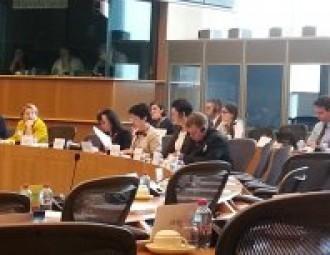Belarus as a challenge for European politics

The roundtable “EU-Belarus puzzle: rethinking European policy towards Belarus” took place in Brussels on June 19.
The event was organized by the International Consortium “EuroBelarus”, Legal Transformation Centre “Lawtrend” and supported by Werner Schulz, the member of the European Parliament.
As EuroBelarus Information Service earlier reported, the roundtable was aimed at discussion of the EU policies towards Belarus and the possible ways for its adjustment.
Andrei Yahorau, the head of the Centre for European Transformation, noted that during the roundtable the policies of the EU towards Belarus introduced after December 19, 2010 were discussed. “It is exactly 2,5 years that passed since the events of December 19, 2010, which made EU introduce new package of sanctions towards Belarus. In fact, we discussed how effective these sanctions were and what can be revised, - Yahorau explained. – It is all the more important since the Eastern Partnership Summit is to be held this autumn, and Belarus will be high on agenda there. Besides, actively discussion of Justas Paleckis’ report is going on now in the European Parliament”.
“EU has to support everyone”
In his report introduced during the roundtable Andrei Yahorau mentioned that Belarus is a serious challenge for European politics, as “European politics can be successful only if it corresponds with the reform strategy within Belarus, or if it is aimed at support of those political players in the country who want the change of situation”, - he explained.
There exist different kinds of political players in Belarus, the head of the CET stated: “Some are designed for establishing dialog with the regime, some, like the National Platform of the Eastern Partnership Civil Society Forum, are for the public forms of dialog similar to the roundtable in Poland, and some have revolutionary approaches to the change of situation in Belarus”.
In the situation when Belarusan political players are not coordinated in their actions and can’t agree on common strategy, EU has to support everyone, which means that it creates chaos within Belarus, as well as making its policies unclear, Andrei Yahorau claims. “This is the main problem of EU-Belarus cooperation and the main problem of constructing any European policy towards Belarus”.
“Inter-strategic” Paleckis’ report
In the above mentioned relations scheme Justas Paleckis’ report can be placed “in the area between bureaucratic dialog and the strategy for public dialog of the civil society with the Belarusan political regime”.
“And being an attempt to formulate the strategy of involving Belarusan officials into the public dialog to support civil society, Paleckis’ report is of high importance”, - emphasized the head of CET.
Dilemmas of the Dialog on Modernization
Elena Tonkacheva, human rights activist and the head of the Legal Transformation Centre “Lawtrend”, highlighted one more problematic issue in Belarus-EU relations, namely the development of the “European Dialog o Modernization” (EDM) and arranging third and further stages of this program.
“There is no doubt that participation of the state experts in the EDM could enrich it a lot. However, considering it from the NGOs’ prospective, we are afraid that it can put the organizers of the dialog before the dilemma: whether to exclude Belarusan state experts from participation in the dialog, or to reject the discussion of the main EDM problems, such as political and legislative reforms, i.e. the problem of introducing ombudsman-institution, constitutional reform, as well as reforms of the penitentiary system, law-enforcement agencies and advocacy”, - she said.
It is also very important to give equal attention to all four platforms of the EDM, as otherwise it will basically mean the elimination of the initial form of the dialog as the EU operating tool, the head of Lawtrend noted.
Elena Tonkacheva also mentioned that the authorities can demand to narrow the list of participants from the human rights organizations and political organizations in exchange for their participation in this program: “From the reviews given by the EU officials we see that such position is unacceptable. And we adhere to the position of equal participation and preservation of all the experts and political actors interested”.
-
03.01
-
07.10
-
22.09
-
17.08
-
12.08
-
30.09








































